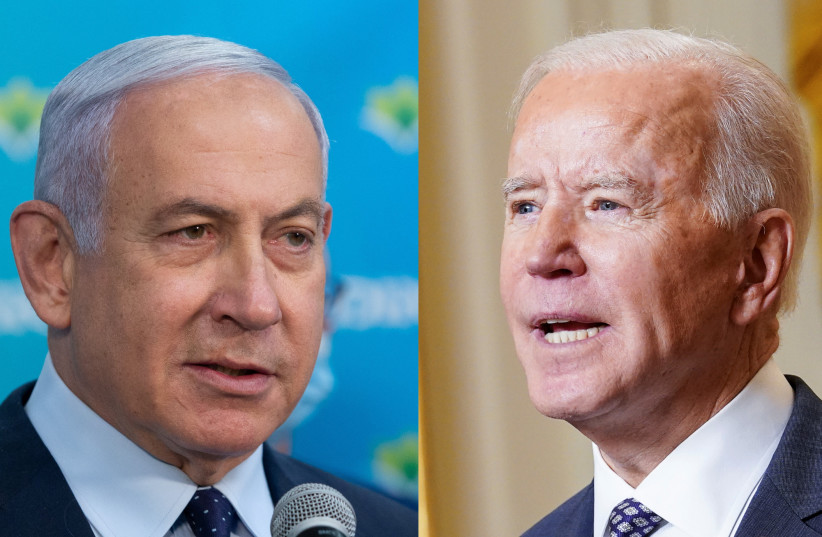The Biden administration is open to hearing Israeli concerns, but doesn’t seem to be taking them into consideration, the source added.
By LAHAV HARKOV, OMRI NAHMIAS, JPOST APRIL 18, 2021
Israeli ministers expressed concern about the nuclear talks between the US and Iran, following a diplomatic-security cabinet meeting on Sunday.
“The Americans want a deal at all costs and the Iranians know it,” said a source in the meeting.
The Biden administration is open to hearing Israeli concerns, the source added, but doesn’t seem to be taking them into consideration.
The diplomatic-security cabinet meeting – the first in two months – focused on the Iranian threat a week after a major attack on the nuclear site at Natanz, as well as an attack on an Iranian ship serving as a military base on the Red Sea, both by Israel according to security sources, and as the US and Iran hold indirect negotiations.
Cabinet ministers heard security briefings from the head of security branches, including National Security Adviser Meir Ben-Shabbat and Mossad chief Yossi Cohen, who plan to travel to Washington next week and meet with Biden administration officials. The ministers discussed how to respond to the US position, and will continue meeting on the topic next week.
Indirect talks between the US and Iran with European mediation have been ongoing in Vienna for the past two weeks, and the stated goal is for both sides to return to compliance with the Joint Comprehensive Plan of Action, as the 2015 Iran nuclear deal is known.
US National Security Advisor Jake Sullivan told FOX News Sunday that the US will not make any concessions until it has confidence Iran will return to compliance with the 2015 Iran deal.
Sullivan said the talks “have been constructive in the sense that there is real effort under way there with the permanent five members of the [UN] Security Council plus Germany on the one hand, and Iran on the other hand, to get on the table all of the issues related to both sanctions and nuclear issues so that we could end up back in the deal on a compliance-for-compliance basis.”
However, he would not detail what “compliance-for-compliance” would mean.
“What I will say,” Sullivan added, “is that the United States is not going to lift sanctions unless we have clarity and confidence that Iran will fully return to compliance with its obligations under the deal.”
Those obligations include stopping advancements in its nuclear program, expanding its breakout time and reducing its enrichment, he said. Last week, Iran increased its uranium enrichment from 20% to 60%, more than ever before; the maximum purity of uranium allowed in the JCPOA is 5%.
Israeli officials have said that the Biden administration’s current goal to return to the JCPOA is not enough, and will allow Iran to develop a nuclear weapon with an international imprimatur after the deal expires in 2030.
Ambassador to the US Gilad Erdan pointed out that US Secretary of State Antony Blinken said the Iran deal needs to be “longer and stronger.”
“This is the same criticism the prime minister brought up years ago,” Erdan told Channel 12 on Saturday night, “that the agreement will expire in a number of years and if we return to this agreement, Iran will have the legal permission to have thousands of centrifuges, bringing it closer to the ability to have a nuclear weapon.”
Erdan denied a report that the Biden administration asked Israelis to be more discreet in their comments on the attack on Natanz and other actions against Iran. Officials in Jerusalem have not publicly acknowledged an Israeli role in the attack, but it was leaked to local and not foreign media, and has not been censored by the military censor, an unusual move for an operation of that kind.
In response to those reports, Erdan said that when Prime Minister Benjamin Netanyahu spoke with US President Joe Biden, he said that “Israel is a sovereign and independent country, and we reserve for ourselves all the options to behave as we see fit. Israel isn’t in the same situation as the US; it’s an existential threat. Iran threatens to destroy Israel directly.”
Meretz MK Yair Golan, former IDF deputy chief of staff, said on Sunday that he supports a return to the Iran deal.
Golan said that the IDF analyzed the JCPOA in 2015 and found that “no step, open or secret, by any of the nations of the world against the Iranian project, rolled back the nuclear program like the agreement did. In effect, the agreement brought about a situation in which, instead of dealing with an immediate problem of when Iran will break out to a bomb, Israel could for the first time in a decade deal with the Iranian nuclear threat without feeling like a sword is at its neck.”
The Meretz MK argued that delaying the nuclear program and the creation of a united international front against an Iranian nuclear program were effective and positive for Israel.
To those who oppose the deal, Golan said: “There is no better alternative that can be achieved. [Netanyahu] must understand that… all Israel can do is cooperate with the Biden administration and ensure that Israel’s interests are expressed as best as possible in the future agreement.”




Also from thearabweekly.com With Biden now in office, the Saudis are now also running for cover.
The Arab states that reconciled with Israel during the Trump administration are now running for cover with anti-Israel Biden administration now in power. From thearabweekly.com